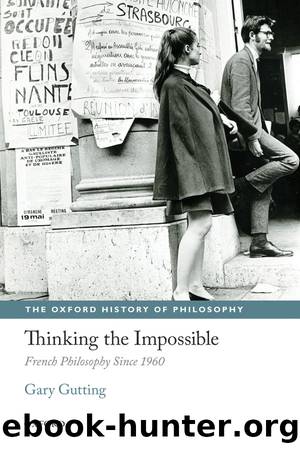Thinking the Impossible by Gutting Gary;

Author:Gutting, Gary; [Gutting, Gary]
Language: eng
Format: epub
ISBN: 9780199674671
Publisher: Oxford University Press, Incorporated
Published: 2014-09-02T10:11:03+00:00
Why be a Nietzschean?
While Derrida is, of course, a âmore complicatedâ case, Deleuze and Foucault appeal to Nietzsche to support their opposition to Hegel. But what precisely is the problem with Hegel? Their objections are both philosophical and cultural (or ethical). Philosophically, they reject Hegelian âtotalizationâ, his claim to provide a comprehensive meaning for history, based on an account that purports to be the final (absolute) truth about reality. Culturally or ethically, they oppose institutions and practices (to a good approximation, the values of conventional, bourgeois society) that they think Hegelâs philosophy supports. Since Hegel offers elaborate cases (especially in his Phenomenology and Logic) for his position, we might expect Foucault and Deleuze to offer detailed specific objections to these arguments. We find, however, hardly any trace of such an approach. They begin with the assumption that the Hegelian system must be rejected, and set out, along lines Foucault found suggested by Hyppolite, to develop alternatives (ontological or methodological) to them. Nor do they offer any critique (Marxist or otherwise) of bourgeois society; they merely register their obvious disdain and outrage at its deficiencies. It might well be that, in both instances, they regard the cases against what they oppose to have been conclusively made by other philosophers and social critics. (Deleuze, however, seems to regard explicit criticism as the sort of âreactiveâ movement he wants to replace with pure affirmation.) No matter, they come to their intellectual project with firm anti-Hegelian convictions that function as starting-points, not claims they need to establish.
I do not intend this point as a criticism. All philosophies are developed on the basis of pre-philosophical convictions of one sort or another. Philosophical inquiry often consists in the critical examination of these convictions (at least by testing their mutual consistency) and in development (refinement, extension, application) of them. Properly carried out, this process can provide important indirect support for the initial convictions by answering possible objections and showing the intellectual fruitfulness of the convictions. Philosophical inquiry becomes not a presuppositionless derivation of its conclusions but a persuasive elaboration of its presuppositions.18
In the case of Deleuze, the elaboration will not be of the simple denial of Hegelian ontology but of Deleuzeâs positive alternative ontology, his philosophy of difference understood as creative affirmation rather than negation. Although we cannot even touch its surface here, Deleuzeâs elaboration over the course of his career was impressive. He began by showing how elements of his ontological view could be developed from the work of a wide variety of philosophers: Hume, Spinoza, Bergson, Nietzsche. Then he showed, in Difference and Repetition and The Logic of Sense, how his approach could fruitfully transform our understanding of classical philosophical problems such as the plurality of being (one-many), causality, and the nature of representation, of sensation, of thought, etc. In other works, he demonstrated the power of his position to illuminate art, literature, psychology, economics, and politics. This sort of elaboration does not prove that the viewpoint is true (or otherwise to be preferred over
Download
This site does not store any files on its server. We only index and link to content provided by other sites. Please contact the content providers to delete copyright contents if any and email us, we'll remove relevant links or contents immediately.
Verus Israel: Study of the Relations Between Christians and Jews in the Roman Empire, AD 135-425 by Marcel Simon(550)
Infocracy by Byung-Chul Han(532)
Caesar Rules: The Emperor in the Changing Roman World (c. 50 BC â AD 565) by Olivier Hekster(527)
Europe, Strategy and Armed Forces by Sven Biscop Jo Coelmont(477)
Banned in the U.S.A. : A Reference Guide to Book Censorship in Schools and Public Libraries by Herbert N. Foerstel(444)
Reading Colonial Japan by Mason Michele;Lee Helen;(441)
Give Me Liberty, Seventh Edition by Foner Eric & DuVal Kathleen & McGirr Lisa(435)
The Roman World 44 BC-AD 180 by Martin Goodman(434)
DS001-THE MAN OF BRONZE by J.R.A(419)
The Dangerous Life and Ideas of Diogenes the Cynic by Jean-Manuel Roubineau(417)
The Oxford History of World War II by Richard Overy(414)
Introducing Christian Ethics by Samuel Wells and Ben Quash with Rebekah Eklund(408)
Imperial Rome AD 193 - 284 by Ando Clifford(407)
american english file 1 student book 3rd edition by Unknown(403)
Basic japanese A grammar and workbook by Unknown(381)
Literary Mathematics by Michael Gavin;(373)
Language Hacking Mandarin by Benny Lewis & Dr. Licheng Gu(351)
The Oxford History of the Renaissance by Campbell Gordon;(331)
How to Reach the 9.0 in IELTS Academic Reading by IELTS Medical(331)
